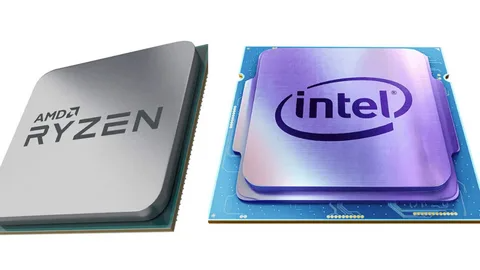Let’s be real here. When you’re putting together a gaming rig, the processor is not the most exhilarating piece. Most of us drool over the graphics card, maybe fuss over monitor specs, and only then wonder which CPU should I get.
But here’s the thing: your processor silently determines the fate of your gaming experience. All those choppy frame rates, random stutters, or sluggish load times? Yep, all the CPU’s fault. So, if you’ve been staring at the names i3, i5, i7, or various Ryzen numbers and feel like you’ve stumbled into some secret code, fear not. We’re about to break it down. Plain and simple.
First off… What is a CPU?
It’s like the brain of your PC. Your software card handles the attention shadow, textures, explosions and so on. The behind-the-scenes work is handled by the CPU. To ensure each and every enemy appears when they should, avoid crazy lag in a multiplayer match, and keep the entire game world ticking along without weird hiccups.
The smoother the games, the more heavy it is on the “brain.” But then, there are good CPUs for gaming and other CPUs for other work. So, which matchups are better? Like i5 vs i7 for gaming? Or i3 vs i5? Or even i5 vs Ryzen processors? Let me tell you that they’re all good in their own ways. Especially the ones that are heavy on logic, AI, or open-world ones. So yeah, your processor deserves some attention.
Why Do Gamers Even Care About CPUs?
Surely, not all games hammer on the graphics card alone. Some titles are quite a bit more CPU-centric–real-time strategy games, large open-world adventures, or first-person shooters with fast action and where frame timing really matters.
And this is where it gets really tricky – having a strong graphics card with a weak processor is like having a racehorse on a leash, the GPU wanting to go full speed but the CPU just not keeping up with it. The outcome? You paid for performance you’re not even using.
Cracking the Code: i3, i5, i7
Let’s demystify the “i” family. No rocket science here.
- i3 is the baseline. It’ll run casual games and older titles fine. Good for budget setups for indie games or eSports, most titles like Rocket League and Valorant on lower settings.
- i5 is the sweet spot. Dead on, this is where all gamers want to be. It’s powerful enough to run AAA games without skipping a beat—if your graphics card is also solid.
- i7 is the big sibling. Extra cores, faster speeds. It’s for gamers who stream, multitask, or want to keep their rig future-proof for a few years.
Keep in mind: greater numbers tend to be more efficient, but they also cost more. It’s all about compromise.
And Then There’s Ryzen…
Ryzen CPUs have the same naming convention. They simply don’t begin with “i.” Instead, you have:
- Ryzen 3 – budget
- Ryzen 5 – mid-range
- Ryzen 7 – high-end
Sound familiar? Yep. They line up almost directly with the i3, i5, i7 tiers. But there’s a twist: Ryzen chips often offer more cores and threads at the same price point, which can help with multitasking, streaming, or even squeezing out extra frames in well-optimized games.
They’re also noted for aging less badly—i.e., for lasting longer before requiring an overhaul. Convenient, if you never intend to build your PC to the ground on a bi-yearly basis.
Match-Ups That Actually Matter
Yeah, let’s push them head to head — that is what you want, isn’t it?
i3 vs Ryzen 3
Both do decent with basic gaming. Think casual or less graphically intense titles. But Ryzen might do just a tad better for multitasking, especially if you are the type to keep a dozen tabs open while gaming.
i5 vs Ryzen 5
That’s where it gets spicy. Both are excellent mid-range options and handle modern games like a champ. You’ll hardly notice a difference unless you’re benchmarking side-by-side. Ryzen may win on multitasking; the i5 may win on raw single-core game performance. It’s a coin flip.
i7 vs Ryzen 7
These are for the serious gamers, streamers, or people who just want max performance – or any combination thereof. It’s a beast. They said, “If you’ve got the budget, you can’t really go wrong here.”
So… Which One’s Right for You?
Let’s keep it real: most beginners don’t need a top-tier processor. If your monitor isn’t pushing 144+ frames/second and you’re not planning on modding your games like a mad scientist to stream them, or you’re actually a scientist streaming experiments, then a mid-range chip will do the trick.
- On a tight budget? i3 or Ryzen 3 can get you started.
- Want that balance of price and performance? i5 or Ryzen 5 is your golden ticket.
- Planning to go all-in with streaming, video editing, or future-proofing? Look at i7 or Ryzen 7.
Pick based on your habits, not just online hype.
A Quick Word on Specs—Without the Tech Overload
You’ve probably seen terms like “cores,” “threads,” and “clock speed” thrown around. Here’s the no-nonsense version:
- Cores are like individual workers in your CPU. More cores = more multitasking.
- Threads are like virtual assistants for each core. They help share the workload.
- Clock speed is how fast each core works. Higher usually means better—but only when paired with decent architecture.
Basically, you want a mix of decent core count and good speed. Don’t just chase numbers—context matters.
The Bottom Line? It’s About the Experience.
Selecting a processor is not about chasing after the biggest number or the shiniest specs. It’s about understanding what kind of gamer you are. You don’t need a monster CPU to play Fortnite or Apex Legends. But if you’re a Cyberpunk 2077 fan on ultra settings or modding Skyrim and streaming together? Then, sure, go for something better.
Think about it: buying a high-end processor and then pairing it with a low-end graphics card is like installing a jet engine in a go-kart. Balance is the key. So, take a minute. Consider what you actually use to play, how often, and what else you’re doing while playing. Once you have that, the correct CPU choice pretty much writes itself.
And gosh, if you’re still lost, no big deal. Ask someone, read a little bit (you’re already well on your way), or consult with someone who has already cobbled together a rig. The gaming community will always be happy to share a piece of advice. Sometimes too much.



